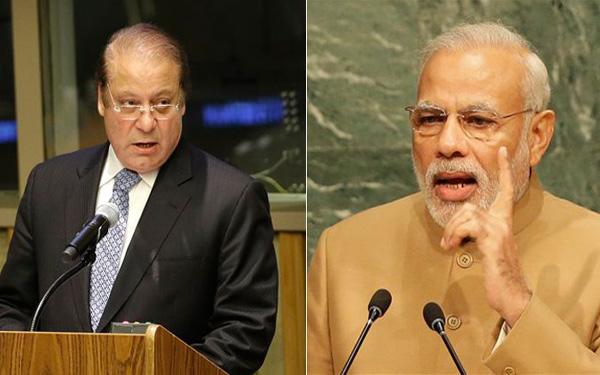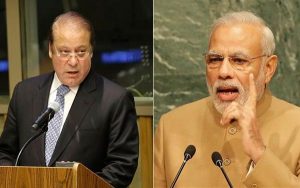Janjivan Bureau
Amritsar: In the midst of heightened Indo-Pak tensions, Pakistani Prime Minister’s Foreign Affairs Advisor Sartaj Aziz arrived here this evening to attend the Heart of Asia conference amid speculation about whether the two sides will have bilateral talks on the sidelines of the conclave to break the ice in ties.
Hours after his arrival, Aziz attended a dinner where he exchanged pleasentaries with Prime Minister Narendra Modi.
Aziz was earlier scheduled to arrive here tomorrow but came a day early due to prevailing weather condition. Almost the entire northern India has been affected by thick fog for the last two days, delaying flights and train operations.
Aziz advanced his visit after he was informed about the weather condition, sources said.
There was no clarity on whether there will be a bilateral meeting on the sidelines of the conference.
Interestingly, in a goodwill gesture, Aziz sent a bouquet to External Affairs Minister Sushma Swaraj, extending his “sincere good wishes for her full and speedy recovery” from illness.
Swaraj, undergoing treatment for renal failure, is not attending the Heart of Asia conference and Finance Minister Arun Jaitley will head the Indian delegation at the Ministerial deliberations.
Aziz, who arrived here on a special flight, was received at the airport by Pakistan High Commissioner Abdul Basit.
Pakistan and India had held a meeting during last year’s Heart of Asia Summit in Islamabad during which both countries had agreed to start a ‘Comprehensive Bilateral Dialogue’ which was to cover all outstanding issues. The resumption of the dialogue could, however, not take place due to the Pathankot terror attack in January this year.
Earlier this week, Pakistan High Commissioner Abdul Basit had said Pakistan was ready for unconditional resumption of dialogue if India was ready.
India has made it clear it will never accept continued cross border terrorism as the ‘new normal’ in bilateral ties with Pakistan and that talks cannot take place in an atmosphere of “continued terror”.
Tension between the two countries escalated after the cross border terror attack on an army base in Nagrota.
During tomorrow’s proceedings at the conference, India is likely to step up its efforts to corner Pakistan diplomatically by mobilising support for concrete action against state-sponsored terrorism.
As Afghanistan faces the resurgence of Taliban, a conference of major regional and global powers began today in this holy city to explore ways to effectively deal with threat of terrorism in the region, its complex security matrix and help the war-ravaged nation in its transition.
Being attended by nearly 40 countries and leading groupings like the European Union, the annual conference of the Heart of Asia — Istanbul Process is deliberating on various challenges facing Afghanistan, including revival of a peace process in the conflict-ridden country.
Today, senior officials of all 14 countries, including India, China, Russia, Iran and Pakistan, and representatives of 17 supporting nations were deliberating on a vast range of issues facing the region including its complex security scenario and dealing with threat of terrorism, radicalisation and extremism.
Issues like enhancing Afghanistan’s connectivity with South and Central Asian countries to boost trade were being discussed at the senior officials’ meeting which was co-chaired by India’s Foreign Secretary S Jaishankar and Deputy Foreign Minister of Afghanistan Hikmat Khaleel Karzai.
The meeting is finalising the text for tomorrow’s Ministerial Conference and is also deliberating on its Declaration which will have substantial portion on terrorism.
Pakistani Prime Minister’s Foreign Affairs Advisor Sartaj Aziz is representing Islamabad at the Ministerial conference on Sunday which will be jointly inaugurated by Prime Minister Narendra Modi and Afghan President Ashraf Ghani.
The annual conference is taking place amid heightened tension between India and Pakistan in the wake of the audacious terror attack on Nagrota army base and there was no clarity on an Indo-Pak bilateral meeting on the sidelines of the conclave.
India had already made it clear that it would never accept continuing cross-border terrorism as the “new normal” in bilateral ties with Pakistan while making it clear that talks cannot take place in an atmosphere of “continued terror”.
At the senior officials’ meeting, Afghanistan, which has also been facing increased attacks from terror groups operating from Pakistan, pushed for a regional counter-terror framework.
Ahead of the conference, both India and Afghanistan had called terror emanating from Pakistan as the “greatest threat” to regional peace and stability, and both the countries are set to press hard for adopting the counter-terror framework at tomorrow’s deliberations. .


















